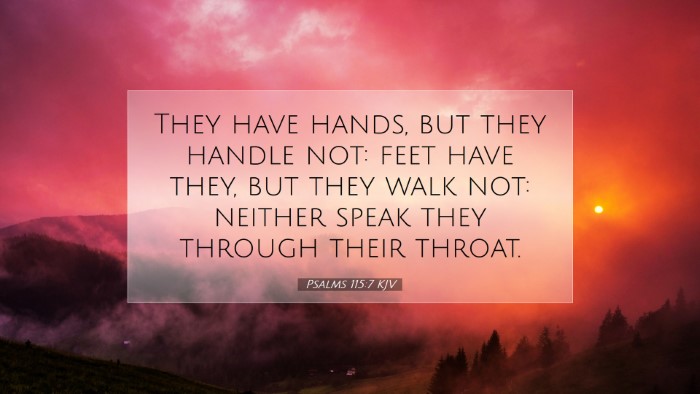Commentary on Psalms 115:7
Psalms 115:7 states: "They have ears, but do not hear; noses, but do not smell." This verse addresses the issue of idolatry and the inherent futility of false gods, illustrating a significant theme in the Book of Psalms and the larger narrative of Scripture. Here, we explore insights from notable public domain commentaries including Matthew Henry, Albert Barnes, and Adam Clarke to provide a comprehensive exegesis of this verse.
General Context of Psalm 115
Psalm 115 is a passage that directs its focus on the sovereignty of God and contrasts the living God with idols. The psalm begins by emphasizing that the glory belongs to God alone and not to humanity. The psalmist reasons with the people to trust in God who has made Heaven and earth, which leads to invective against the wooden and stone idols worshiped by the nations surrounding Israel.
Insights from Matthew Henry
Matthew Henry characterizes this verse as a reflection on the impotency of idols. He points out that idols, regardless of their craftsmanship, lack the essential qualities that belong to the living God. Henry notes, "They have ears, but they hear not; they have noses, but they smell not," elucidating how these representations cannot engage with the world or respond to the needs of their worshippers.
-
Function of the Senses: According to Henry, the verse implies that while the idols are made with features similar to humans, they are devoid of the ability to perceive. They are lifeless entities, contrasting significantly with the active and living God who hears prayers, smells the offerings, and interacts with His creation.
Insights from Albert Barnes
Albert Barnes emphasizes the meaning of this verse within the larger critique of idolatry. He states that the senselessness of idols is highlighted as a deliberate reminder of their ineptitude. Barnes elaborates:
-
Symbol of Blindness: Much like the eyes that do not see, the ears of these idols serve as a metaphor for spiritual and moral blindness among those who worship them. This blindness, in Barnes's view, is a reflection of the people’s refusal to acknowledge the one true God.
-
Reflection on Human Rebellion: Barnes argues that the very construction of such idols signifies humanity's rebellion against God. By crafting gods from material things, worshippers demonstrate their denial of the Creator’s omnipotence.
Insights from Adam Clarke
Adam Clarke provides a meticulous breakdown of the function of each bodily part mentioned in the verse. He asserts that the use of sensory organs in this context serves to demonstrate the foolishness of idolatry:
-
Spiritual Application: Clarke contends that the idea of having ears and not hearing is not merely a physical description but conveys a deeper truth about spiritual perception. It highlights that those who worship idols are spiritually deaf, incapable of hearing the voice of God.
-
Physical vs. Spiritual Senses: He also discusses how each organ mentioned—ears and noses—points to an inability to engage with God on a personal level, leading them away from genuine worship. The sensory deprivation speaks to a larger truth of the spiritual lifelessness experienced by idol worshippers.
Theological Implications
The implications of Psalms 115:7 extend deeply into the realm of practical theology. It serves as a reminder of the dangers inherent in idolatry, which can manifest in various forms today—ranging from materialism to celebrity worship, and even theological misconceptions that diminish God's sovereignty.
-
Call for Reflection: Pastors and theologians are called to reflect on this scripture when confronting modern forms of idolatry, encouraging congregations to evaluate their true allegiances.
-
Encouragement to Seek the Living God: The rich contrast between the impotence of idols and the omnipotence of God should compel believers to cultivate a relationship with the living God who speaks, hears, and intervenes in human affairs.
Conclusion
Psalms 115:7 serves as a poignant reminder of the futility of idol worship and the absolute necessity of recognizing the living God. By synthesizing insights from Matthew Henry, Albert Barnes, and Adam Clarke, the necessity for discernment in faith practices remains clear. As students of theology, pastors, and scholars engage with this text, they are reminded to uphold teachings that elevate God’s sovereignty and expose the lifelessness of anything that seeks to take His place in the human heart.


